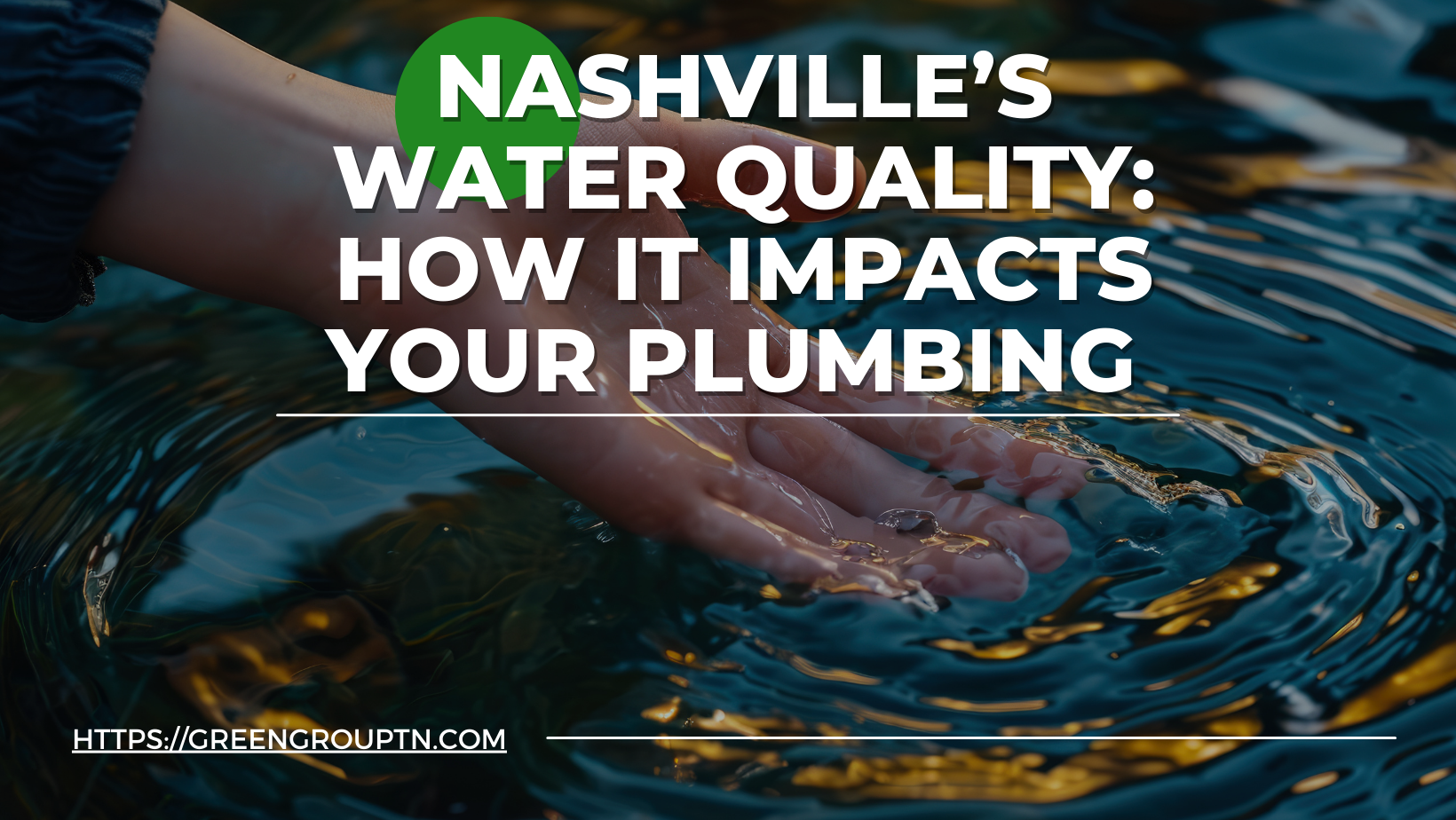Understanding Nashville’s water quality is crucial for maintaining a healthy and efficient plumbing system in your home. While the city’s water supply meets federal and state safety standards, the specific characteristics of Nashville’s water – especially its moderate hardness – can significantly impact your plumbing over time. At Green Group, we’re committed to helping Nashville homeowners understand these water quality factors and the steps you can take to protect your plumbing.
Nashville’s Water Supply: What Homeowners Should Know
Nashville’s water comes from the Cumberland River and undergoes rigorous treatment to remove contaminants and meet safety standards. However, Nashville’s water is classified as “moderately hard,” meaning it contains higher levels of minerals like calcium and magnesium. These minerals are safe for consumption but can lead to plumbing issues like buildup, efficiency loss, and premature wear on fixtures and appliances.
Effects of Hard Water on Your Plumbing System
Hard water is one of the most common plumbing concerns in Nashville, impacting various aspects of your home’s plumbing:
– Mineral Buildup in Pipes: Over time, calcium and magnesium deposits can accumulate in pipes, narrowing water flow and increasing pressure. This buildup can cause slow drains, blockages, and, if left unchecked, even burst pipes, leading to costly repairs.
– Reduced Efficiency of Water Heaters: Hard water also affects water heaters. Minerals form scale buildup inside the tank, requiring the heater to work harder to warm water, which can lead to higher energy bills and reduce the appliance’s lifespan.
– Damage to Fixtures and Appliances: Hard water leaves mineral deposits on faucets, showerheads, and appliances, causing unsightly stains and leading to frequent maintenance and replacements.
How to Address Hard Water Challenges in Nashville
Given the impact of hard water on plumbing, homeowners should consider several strategies to protect their systems and keep water flowing smoothly:
– Install a Water Softener: A water softener effectively reduces hardness by replacing calcium and magnesium ions with sodium. This change minimizes mineral buildup in your pipes, extending the life of your plumbing and appliances. Learn more about water softeners here.
– Regular Plumbing Maintenance: Routine maintenance is essential in areas with hard water. Scheduling annual inspections with Green Group can help identify mineral-related issues early. We’ll also clean or replace fixtures affected by mineral deposits to keep everything working efficiently.
– DIY Tip: Use Vinegar to Clean Fixtures: An easy, budget-friendly way to clear mineral buildup on faucets and showerheads is to soak them in vinegar. The vinegar’s acidity dissolves the deposits, restoring the function and appearance of your fixtures.
Other Water Quality Concerns Beyond Hardness
While hardness is a primary concern, other aspects of Nashville’s water quality can also impact your plumbing. Here’s what to watch for:
– Chlorine and Chloramines: To ensure water safety, Nashville uses chlorine and chloramines for disinfection. While effective against bacteria, these chemicals can wear down rubber seals and gaskets in plumbing systems. Installing a whole-house water filter reduces chlorine levels, improving the water’s taste and smell and extending the lifespan of your plumbing components.
– Sediment and Debris: Sediment can enter your home’s water supply through the municipal system or from older pipes in your home. Accumulated sediment can clog pipes and impact water quality. A sediment filter installed where water enters your home can prevent these particles from reaching your fixtures and causing issues.
– Lead and Other Contaminants: While Nashville’s water meets safety standards, older homes may still have lead pipes or fixtures. If you suspect lead in your plumbing, testing your water and replacing old pipes with safer materials is essential. Adding a point-of-use water filter can further protect your drinking water from lead and other contaminants.
Green Group: Your Partner in Nashville Plumbing and Water Quality Solutions
Understanding the specifics of Nashville water quality allows homeowners to take proactive steps for a healthy plumbing system. By addressing hard water challenges, chlorine exposure, sediment buildup, and potential contaminants, you can protect your plumbing and increase the lifespan of your fixtures and appliances.
At Green Group, we’re dedicated to providing Nashville with expert plumbing solutions tailored to our city’s unique water quality. Whether you’re interested in installing a water softener, need routine maintenance, or want to address specific water quality concerns, our experienced team is here to help. Contact us at 615.756.5057 or visit our website to learn more about our services and schedule a consultation.
With Green Group, you can keep your plumbing in top shape, no matter the challenges posed by Nashville’s water quality. Let us help you maintain a cleaner, more efficient system for years to come!

